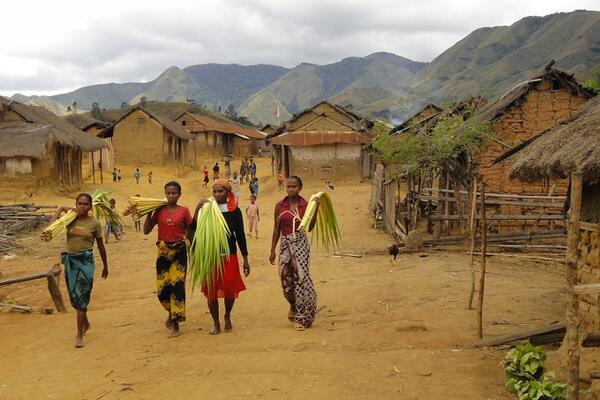
Mainstreaming climate change into Aid for Trade – Sharing lessons learnt
Climate change, environmental pollution and biodiversity loss present increasing risks to trade opportunities for smallholders, cooperatives and small- and medium-sized enterprises (SMEs) in least developed countries. Mainstreaming climate change and environment is, therefore, a necessary design feature of Aid for Trade (AfT) value chain projects. This was the main takeaway from a joint working session between staff from the International Trade Centre (ITC) and the World Trade Organization (WTO) last week.
Staff worked through the ITC Guide on Mainstreaming Environment into Aid for Trade as a means to share lessons learnt between staff from the Enhanced Integrated Framework and the Standards and Trade Development Facility.
Environmental issues, in particular climate change, present a wide ranging set of risks to farmers in developing countries, including extreme weather events, lost productivity and increased incidence of pests and diseases. Climate change is one of several global change factors that are contributing to increased and new food safety, animal and plant risks, as STDF work in this area illustrates.
With the majority of AfT programming focused on agriculture and natural resource value chains, project sustainability is strongly linked to 'climate-proofing'.
The working group followed the four step process in the ITC Guide and analyzed logframes in the agricultural and tourism sectors in order to assess both environment risks and mitigation actions. The group identified risks in the export fruit sector in East Africa, which included misuse of pesticides, land clearance for plantations and over-extraction of water. Possible mitigation actions were recognized, such as training on good agricultural practice, ensuring coherence with local planning and promoting drip irrigation technologies.
The methodology also includes an assessment of opportunities to create value from certified product markets, reducing energy use and recycling waste through composting and improved water management. These actions contribute to competitiveness of the cooperatives and enterprises with whom the AfT programmes are working.
"Mainstreaming environment into Aid for Trade improves both environmental outcomes and the competitiveness of the private sector in developing countries," said Mr Alexander Kasterine, Senior Advisor for the ITC Trade for Sustainable Development Programme, who presented the Guide to WTO staff.
"Environment is one of the three major cross-cutting issues that the EIF is focusing on during the second phase of the programme. With respect to the environment, we aim to do this in three main ways, firstly through the design of EIF projects, secondly in the analytical work undertaken through the Diagnostic Trade Integration Studies, the DTIS, and thirdly by leveraging finance related to the environment and climate change," said Mr Ratnakar Adhikari, Executive Director of the Executive Secretariat for the EIF.
Mr Adhikari also mentioned that mainstreaming environment helps the EIF Countries to optimize the use of scarce resources and find new export opportunities besides leveraging resources.



